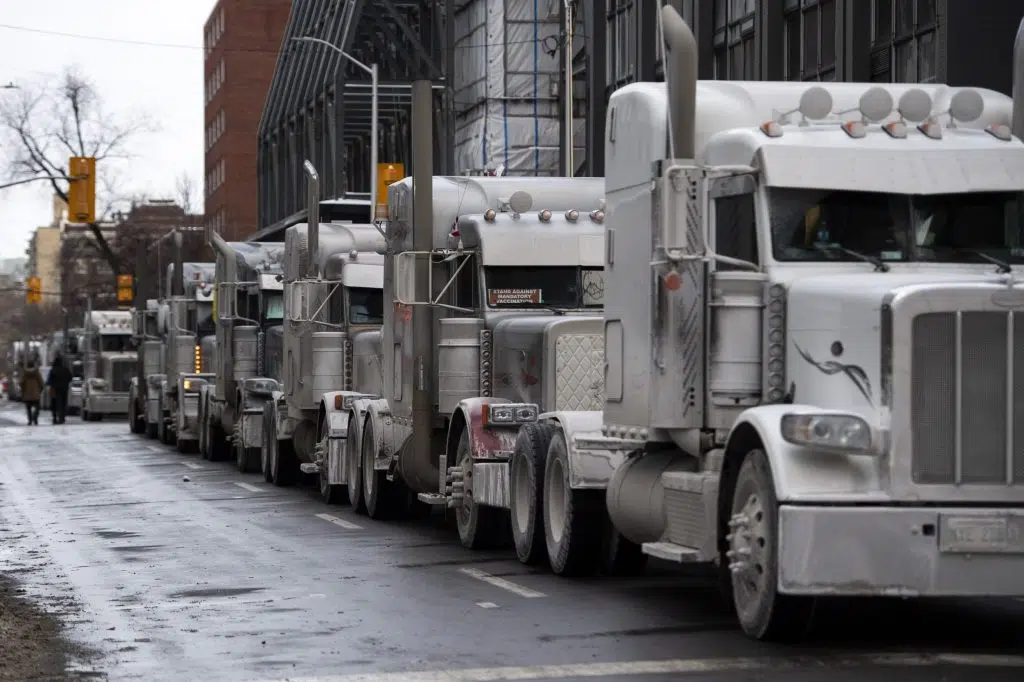A former deputy minister in two Saskatchewan governments said the invoking of the Emergencies Act by Prime Minister Justin Trudeau on Monday didn’t surprise him, but it is a “judgment call.”
Howard Leeson, a retired university professor who specialized in fields of intergovernmental affairs and federal-provincial relations, served as deputy minister of intergovernmental affairs in the Allan Blakeney and Roy Romanow governments.
Commenting generally, Leeson said the federal act gives significant emergency power to the central Canadian government.
“It’s an unusual power. It allows a national government to take charge of virtually anything in a society, despite the fact that we’re a federation and that the provinces have certain responsibilities as well,” Leeson said.
While it doesn’t require the approval of the provincial governments, there is a requirement in the Emergencies Act that the prime minister consult with the provinces — something that was not required under the preceding War Measures Act.
Leeson said that consultation did take place, with premiers expressing opinions both for and against invoking the act, though there is no formal role for premiers to take within the Emergencies Act.
“I was not too surprised, frankly, because I think it’s been invoked … for two reasons,” Leeson explained.
He noted the general perception that the blockades occurring across the country — but in Ontario particularly — have interfered with the Canadian economy and with the health and welfare of Ottawa people.
As well, jurisdictional mixups left various levels of government wondering whose job it was to tackle the convoy of protesters in Ottawa and restore order.
“I think it’s debatable … I think it’s a judgment call, frankly,” Leeson said, adding the call the current prime minister’s father, Pierre Elliot Trudeau, made in 1970 to invoke the War Measures Act was much the same.
Although the primary concerns for which each act was invoked focused on a single province, the acts were meant to mitigate potential international or federal-provincial consequences that might arise.
“I suspect the people of Ottawa would think it’s a good call,” Leeson said. “I’m not sure that people in other parts of Canada that are more remote from what’s happening would think it necessary at all.
“It’s really a judgment call but on balance, I suspect that they will be able to get Parliament to agree with them.”
Leeson said there will be some considerations in the coming days and weeks that might put a check on the powers the government has allowed itself by invoking the act.
The primary one: The possibility that Parliament — and, Leeson suspected, the House of Commons in particular — might terminate the act prematurely by vote upon review should they find it to be inappropriate.
He said this is much more likely because the current government only holds a minority, whereas a majority government would only have a remote possibility for review.
“We’ll have to wait and see how the parties vote if there’s something brought forward to vote in the next week or two,” Leeson said.
It’s also possible that someone might bring concerns about the act before a federal court or Canada’s Supreme Court retroactively. While Leeson noted this would likely be an ex post facto move, the court would then need to “determine whether or not the matter was of sufficient importance that the emergency powers act was enacted.”
Leeson predicted actions executed under the act will concentrate on Ottawa over the next week, given that the blockades at Windsor and Coutts, Alta., have been disengaged. With the additional powers involved as a result of the Emergencies Act, Leeson suspected there might be some reluctance on the part of demonstrators to continue to push forward.
“And then after that, we’ll have to see what consequences there are … for those people who have been arrested and/or have been found to have (had violations) as in Coutts with the weapons charges,” Leeson said.











